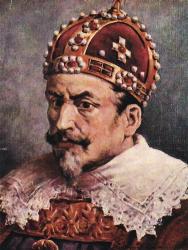|
|
|
|
|
|
Perhaps the most controversial period in Polish history, it was a big mistake and the decline of the Polish-Lithuanian Commonwealth is due largely to it.
Thinking that electing as king a member of the reigning Swedish royal Vasa family would salve the wounds caused by the Livonian War of 1558-1582, the Polish Sejm selected Zygmunt III Waza. He reigned from 1587 to 1632. The Polish Sejm then elected his son, Wladyslaw IV Waza as their next king, reigning from 1632 to 1648. It then elected another son, Jan II Kazimierz Waza, as king who served from 1648 until 1668, when he abdicated the throne.
Instead of insuring peace, the presence of a Vasa on the throne of Poland and the dynastic feud it brought along with it directly contributed to nearly continuous conflict with Sweden:
The culmination occurred with:
During their reigns, they introduced religious intolerance, emptied the treasury, diminished the civil liberties of the common man, and listened to the Jesuits far too much. It was an era of intrigue, intolerance, and incompetence. It nearly brought the Polish-Lithuanian Commonwealth to its knees.
It was in this atmosphere that traitorous noblemen Janusz and Boguslaw Radziwill signed the Union of Kedainiai with Sweden in 1655, which would have carved up the Polish-Lithuanian Commonwealth had it ever been implemented.
What were they thinking?



